|
|
|
Sort Order |
|
|
|
Items / Page
|
|
|
|
|
|
|
| Srl | Item |
| 1 |
ID:
122309
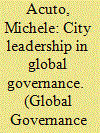

|
|
|
|
|
| Publication |
2013.
|
| Summary/Abstract |
The international society's lack of leadership is often blamed for many of the shortcomings in addressing global challenges. Yet this focus might have been on the wrong kind of leaders: rather than heads of state and diplomats, effective international responses might be better situated with the ordinary influence of city leaders. While capable of reaching beyond urban politics and developing transnational networks, mayors might represent a key hinge for the effective response to important challenges like climate change or sustainability. Against this scholarly oversight, this article demonstrates how mayors have a catalytic influence in global governance. Providing evidence of that role, it summarizes this agency through five nonexclusive features: regime promotion, governance hybridization, diplomatic entrepreneurship, normative mediation, and everyday international influence. Relying on the vast variety of city-led initiatives spawned in the past few decades, this article demands greater attention for the pivotal positioning of city leaders in global governance.
|
|
|
|
|
|
|
|
|
|
|
|
|
|
|
|
| 2 |
ID:
148458
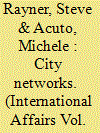

|
|
|
|
|
| Summary/Abstract |
There is today a global recognition that we live in an ‘urban age’ of near-planetary urbanization where cities are at the forefront of all sorts of agendas. Yet little attention is offered to the active role of cities as political drivers of the urban age. There might today be more than two hundred ‘city networks’ globally, with thousands of para-diplomatic connections actively defining relations between cities, international organization and corporate actors. This actively networked texture of the urban age shapes all areas of policy and, not least, international relations, and holds much promise as to possible urban solutions to global challenges. Based on an overview of a representative subset of this mass of city-to-city cooperation (n=170), this article illustrates the landscape of city networking, its issue areas and institutional shapes, and its critical features. As we argue, city networks today are faced by a crucial challenge: while trying to overcome state-centric ‘gridlocks’ cities are, at the same time, building both political–economic as well as very material ‘lock-ins’. We need to pay serious attention to this impact of city diplomacy in international affairs, developing a greater appreciation of the path dependencies and responsibilities this diplomatic activity purports.
|
|
|
|
|
|
|
|
|
|
|
|
|
|
|
|
| 3 |
ID:
107071
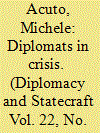

|
|
|
|
|
| Publication |
2011.
|
| Summary/Abstract |
Although "international crisis" is a widespread term, no common definition has yet been achieved: its features have neither been clarified in relation to contemporary events, nor has the role of diplomacy in relation to crises been outlined with precision. Diplomats have even become part of the problem, rather than the problem-solvers, as realist approaches have lost touch with today's poly-lateral world politics. To make up for these lacunae, this article enquires into the present-day nexus between international crisis and diplomacy by first illustrating what international crises mean beyond traditional state-centric definitions and then by considering what diplomacy can offer to tame such turbulent disruptions to the routine of world affairs. In doing so, it introduces a critical definition of international crisis and tests it in relation to a system-oriented description of diplomacy both in its routine and crisis dimensions. Outlining the role of "crisis diplomacy" beyond "diplomatic crises" the essay calls for both a novel understanding of the role of diplomats in these contexts and a greater awareness to the growing complexity of such engagements.
|
|
|
|
|
|
|
|
|
|
|
|
|
|
|
|
| 4 |
ID:
136096
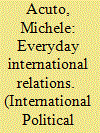

|
|
|
|
|
| Summary/Abstract |
Garbage is stuff that matters: the generation, disposal, and management of waste represent some of the most visceral flows in our society. Yet most international scholars continue to regard it as trivial to focus on the mundane practices and menial materiality associated with managing rubbish. Contra this dissociation, and through an analytics of assemblages, I argue that international theory can (and nowadays must) encompass both the grand designs of diplomacy and the mundane cosmopolitics of everyday life. In the everyday, the “international” is embodied, performed, and domesticated. I chart these multi-scalar connections as they unfold in Sydney, Australia, demonstrating how a focus on a global challenge such as climate change has been redefining the mundane realities of waste management.
|
|
|
|
|
|
|
|
|
|
|
|
|
|
|
|
| 5 |
ID:
163349
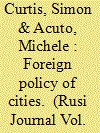

|
|
|
|
|
| Summary/Abstract |
Over the last decade, cities have gained increasing prominence on the world stage. Simon Curtis and Michele Acuto show how and why cities are increasingly flexing their economic and political muscles, and discuss some of the constraints cities face in developing their own foreign policies, as well as the differences between city-based diplomatic activity and traditional state foreign policy. Finally, they discuss the significance of city diplomacy trends for thinking about the international system.
|
|
|
|
|
|
|
|
|
|
|
|
|
|
|
|
| 6 |
ID:
102780
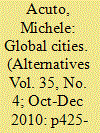

|
|
|
| 7 |
ID:
141209
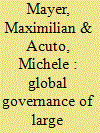

|
|
|
|
|
| Summary/Abstract |
The importance of technology in global affairs is visible to the naked and uninitiated eye. Yet International Relations (IR) still lacks a more systematic and critical attention to the role of technological infrastructures in contemporary global governance dynamics. Here, we seek to prompt IR scholars to move ‘large technical systems’ (LTSs) from the contours of IR narratives to a centre stage, as they hold the potential to respond to pressing challenges for IR scholarship. Employing LTSs to respond to recent publications on the challenge that ‘global governance’ poses to IR, we highlight that an STS-IR encounter can, first, revitalise ‘grand questions’ at the heart of IR and, second, help coping with the complexity of global governance. While this encounter does not offer a ready-tailored panacea for the troubles of IR, a more systematic inquiry into LTSs is a powerful step beyond theoretical and methodological impasses, towards greater inter-disciplinary collaboration.
|
|
|
|
|
|
|
|
|
|
|
|
|
|
|
|
| 8 |
ID:
123351
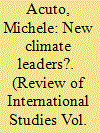

|
|
|
|
|
| Publication |
2013.
|
| Summary/Abstract |
Little interest has thus far been paid to the role of cities in world politics. Yet, several are the examples of city-based engagements suggesting an emerging urban presence in international relations. The Climate Leadership Group, despite its recent lineage, is perhaps the most significant case of metropolitan intersection with global governance. To illustrate this I rely on Actor-Network Theory (ANT) to develop a qualitative network analysis of the evolution of the C40 in the past seven years from a limited gathering of municipal leaders to a transnational organisation partnering with the World Bank. Pinpointed on the unfolding of a twin diplomacy/planning approach, the evolution of the C40 can demonstrate the key role of global cities as actors in global environmental politics. These cities have a pivotal part in charting new geographies of climate governance, prompting the rise of subpolitical policymaking arrangements pinpointed on innovative and hybrid connections. Yet, there remains some important rational continuity, in particular with neoliberalism, which ultimately limits the revolutionary potential these cities might have for international relations.
|
|
|
|
|
|
|
|
|
|
|
|
|
|
|
|
| 9 |
ID:
085770
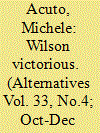

|
|
|
|
|
| Publication |
2008.
|
| Summary/Abstract |
Many authors have issued anxious warnings about a disturbing "backlash against democracy"-this in spite of the growing affirmation of democracy as an international standard against which other systems are measured. This article considers the role of democracy promotion, which is understood as activities aimed at assisting in consolidating, disseminating, and advocating democratic governance in this context. The theoretical framework in which the promotion debate occurs is highlighted in order to show how the concept of "democracy" is socially constructed and interpreted in different ways by the various promoters. The article examines the main targets of this activity (state structures and civil societies) and compares two major supporters of democracy (the European Union and the United States). On this basis, claims about a "democratic rollback" are challenged by reference to hybrid regimes that contrast the idea of democracy with that of civilization. The backlash is better understood as resistence to some of the methods of promotion and some promoters, rather than as being against democracy itself, and the article holds that the best way to promote good governance worldwide is through an oblique, cosmopolitan or European-style democracy that fosters the multiple and processual grounds on which democratic polities can flourish.
|
|
|
|
|
|
|
|
|
|
|
|
|
|
|
|
|
|
|
|
|